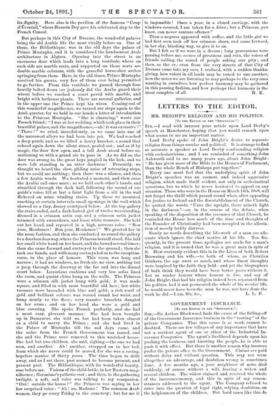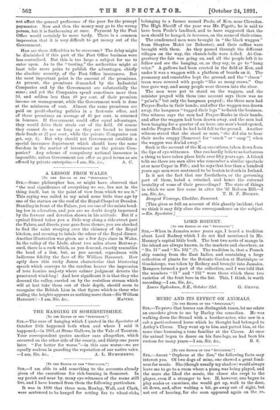GOVERNMENT INSURANCE.
[To THE EDITOR OF THE "SPECTATOR."] SIR,—Sir Arthur Blackwood finds the cause of the falling-off of the Government Insurance business in the " touting " of the private Companies. That this cause is at work, cannot be doubted. There are few villages of any importance that have not a resident agent of one or other of the Industrial In- surance Companies. The agent's livelihood depends upon his pushing the business, and knowing the people, he is able to push it with effect. But there is another reason why insurers prefer the private office to the Government. Claims are paid without delay and without question. This may not seem altogether an advantage, and doubtless wrong is sometimes done. A few months ago, a poor neighbour of mine died suddenly, of course without a will, leaving a widow and several children. The widow claimed and received the whole of the insurance-money, and this in spite of my remon- strances addressed to the agent. The Company refused to enter into the question of legal right, relying, doubtless, on the helplessness of the children. But hard cases like this do
not affect the general preference of the poor for .the prompt paymaster. Now and then the money may go to the wrong person, but it is forthcoming at once. Payment by the Post Office would certainly be more tardy. There is a common impression that it is very difficult to get money out of the Government.
How are these difficulties to be overcome ? The delay might be diminished if this part of the Post Office business were less centralised. But this is too large a subject for me to enter upon. As to the "touting," the authorities might at least take more pains to .publish the advantages, chiefly the absolute security, of the Post Office insurances. But the most important point is the amount of the premiums. At present, the premiums demanded by the Industrial Companies and by the Government are substantially the same; and yet the Companies spend sometimes more than 50, and seldom less than 40 per cent. of their premium income on management, while the Government work is done at the minimum of cost. Almost the same premiums are paid on profit-sharing policies in a first-rate office, and of these premiums an average of 45 per cent. is returned in bonuses. If Government could offer equal advantages, they would drive their rivals out of the field. Of course they cannot do so as long as they are bound to invest their funds at 2* per cent., while the private Companies can get, say, 41. But why should not Government establish a special insurance department which should have the same freedom in the matter of investment as the private Com- panies? Any scheme of compulsory national insurance is impossible, unless Government can offer as good terms as are
offered by private enterprise.—I am, Sir, &c., A. C.



































 Previous page
Previous page